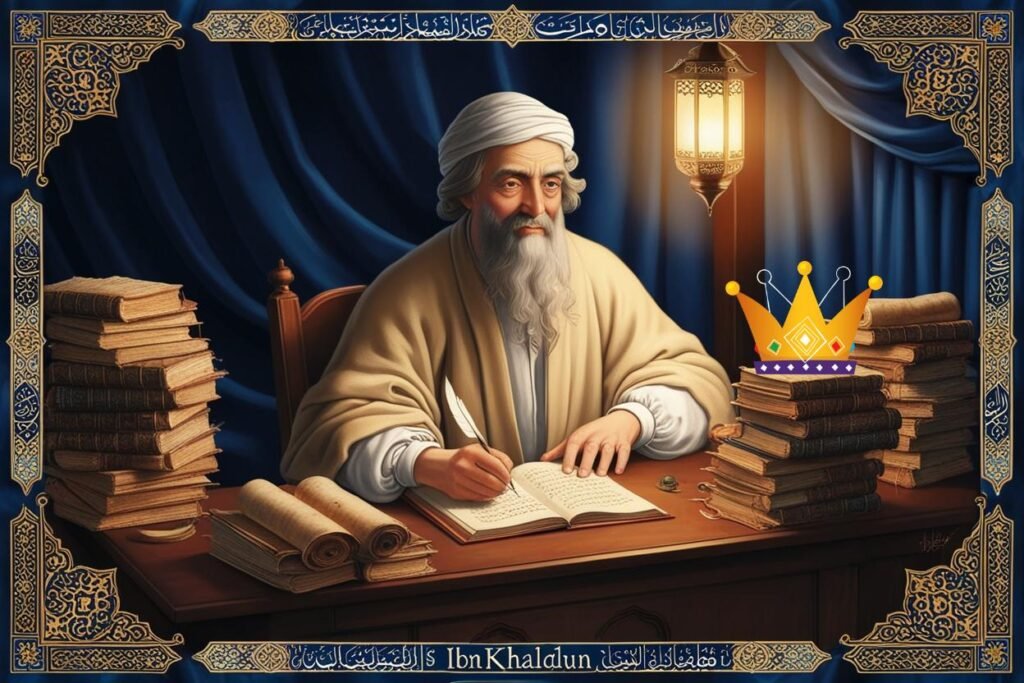Kingship :
The concept of tribalism and power, which holds that a strong group of people must exist and that this group must have numerous subgroups that support, strengthen, and aid it in order to establish itself in power, is among the most crucial concepts that Ibn Khaldun believes are essential to the creation of a particular state. If this group of people starts to abandon their tribalism and start attracting people from other groups, something happens: the tribe itself becomes weaker, which implies that people from other tribes gain control of the state. This is what occurred in a state like the Umayyad state in Andalusia or the Abbasids when they turned to the Turks and Persians for assistance. However, Ibn Khaldun thinks that for a king to reign for a long time, there must be positive traits that show respect for the people who reside in this state, not only tribalism and power. Honoring academics, upholding Sharia, treating the nation’s oppressed fairly, and ensuring that justice is served to everyone are all significant actions taken by the state.
According to Ibn Khaldun, the only way for Arabs in particular to get a kingdom is through religion because Arabs are naturally proud and do not want to submit to anyone. As a result, religion gives them a certain amount of leniency, which stems from their internal motivation to live under a state and work with others to create a strong state, much like the early Muslims did when they conquered numerous nations and swiftly spread into new ones. The same early Muslims were entirely different before Islam; they were dispersed tribes in pre-Islamic times, ,and this no longer existed after the advent of Islam.
Stages of state life :
Ibn Khaldun says that the state goes through five stages, each stage has its people who have certain qualities. The first stage is the stage of seizing the kingdom, in which the state is at the peak of power. In this stage, you will find that the king and the clan around him are in a state of glory. You will find them all in a very great state of glory and ecstasy that they have achieved a great victory, and you will find them very united. The second stage is known as the tyrannical stage. Because the ruler is tyrannizing the rule and attempting to monopolize it, you will see that the people are quite far from him at this point. He also looks to the people around him for assistance in order to get total control over the rule. The third level is characterized by comfort and luxury. Before you start making fun of me and telling me that comfort and luxury follow tyranny, let me clarify that these things are just for the dictator and his entourage at this point, not for regular people.
You will discover that the ruler and his entourage have reached a point of frustration where they are unable to manage their finances. As a result, they begin to construct extremely tall buildings and structures and spend money on unnecessary items. According to Ibn Khaldun, this is the final phase of state oppression, which leads to the subsequent phase of peace and satisfaction. The regulation may have changed once, twice, or three times throughout this stage, and it remains in effect for a very long time. The person in charge during this time lacks any creativity. He mimics the person in front of him precisely, makes no attempt to alter the circumstance, and it stays the same. The final level, which is the stage of waste and extravagance, is reached after all of this. During this time, money is wasted and squandered on lusts, pleasures, celebrity appearances, and grabbing everything in the state. This is all taking place in front of people, and the state is officially disintegrating.
The victor and the vanquished
The notion that the defeated like to emulate the victor is one of the most well-known concepts in Ibn Khaldun’s Muqaddimah and is one that practically everyone has heard of. According to Ibn Khaldun, the human soul is constantly searching for perfection. As a result, if you are in a defeated, backward nation and you see someone living in a more developed nation than your own, you may feel a desire to emulate them. For instance, the then-developed nation of Andalusia was influencing European nations. The European person used to wear the same clothes as the Muslims and imitate them because he saw that this country was an advanced country. On the other hand, you will find that Arabs and Muslims are greatly influenced by the West, whether in culture, clothing, or even in some beliefs and ideas. If you ask any Arab person what his dreams are in life, most likely one of his dreams is to travel to a foreign country.

